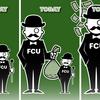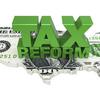Mortgage Blog

Final pass-through rules help some businesses more than others
Summary of the new pass-through rules
A new exclusion or deduction of 20 percent of ‘qualified business income’ will effectively reduce the tax rate on such income by 20 percent. Thus, qualified income otherwise taxed at the top rate of 37 percent will be taxed at 29.6 percent. Self-employment or net investment income taxes, where applicable, would be in addition to these amounts.
Qualified business income would generally include the ordinary, operating income of a trade or business, excluding…

Focus on Federal Tax Reform Profile: Ken Jenkins
RSM US LLP has four offices in Ohio: Cincinnati, Dayton, Columbus and Cleveland and 80 additional offices around the country. Ken Jenkins is the office managing partner responsible for managing and governing the RSM Cincinnati office, which currently has 68 employees. He also leads the tax practice for the Cincinnati office. Jenkins has over 25 years in public accounting, including 11 years at Ernst & Young. Ken left Ernst & Young to join one of Cincinnati’s oldest accounting firms, Rippe & Kingston.…

Grow or die: Credit unions face challenges
Grow or die – that’s the gist of the challenges faced by credit unions. Collectively they have more assets, deposits and customers than ever before, but the small ones often grapple with the costs of technology, salaries and compliance, making it difficult to stay afloat.

Guest column: How small businesses can play to win the lending game
Small business lenders cannot stress enough the importance of small business leaders having a good financial plan in place.
As legendary basketball coach John Wooden once said, “Failing to plan is planning to fail.” In many instances, small businesses jump into debt without properly planning the use of the appropriate repayment of their funds.
Unfortunately, there are also many lenders willing to throw money at small businesses but unwilling to help them properly plan for the use of the funds…

With tax changes, U.S. bank profits drop 41 percent in fourth quarter
U.S. banks and savings institutions insured by the FDIC earned $164.8 billion in 2017, 3.5 percent less than in 2016, the FDIC reported.
The biggest hit came in the fourth quarter, in which the 5,670 insured institutions earned $25.5 billion, down 41 percent from the same quarter in 2016. That was largely due to one-time charges related to the new tax reform law. Most of the charges were the result of what is called deferred tax assets, losses the banks took from bad loans and foreclosed real estate…

How Birmingham banks approach security in the digital age
Birmingham bank experts explain how bank security has changed in recent years

How St. Louis banks compare with 73 other metros
St. Louis banks lag their peers in other metropolitan areas in important measures of strength and growth.

Quarterly bank results: All KC-area banks (except one) see a profitable 2017
The FDIC's numbers from the fourth quarter show that commercial banks based in the Kansas City area had another good year.

Guest column: Tax reform could transform more than your tax department
The scope of recently enacted tax reform, and the speed with which it passed, increase the challenge of figuring out how it applies to businesses.

Wells Fargo CEO Tim Sloan hits back at critics
Wells Fargo CEO Tim Sloan answered back to his chorus of critics as he grapples to get the San Francisco-based bank back on track.
In a March 5 Bloomberg BusinessWeek cover story, Sloan said he’s eager to have a conversation with California Treasurer and gubernatorial candidate John Chiang, who last week called on Sloan to resign.
Wells (NYSE: WFC) was among dozens of financial institutions that honored IOUs from California in 2009 when the state had trouble paying its bills during the Great…
